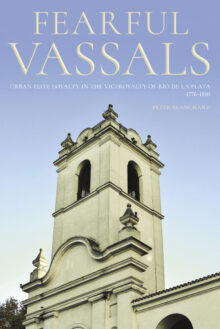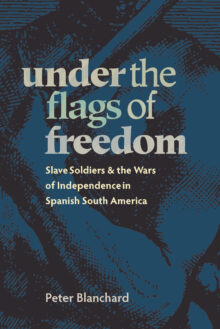
Peter Blanchard
Peter Blanchard is professor emeritus of history at the University of Toronto and a member of the Conference on Latin American History.
Fearful Vassals
Urban Elite Loyalty in the Viceroyalty of Río de la Plata, 1776-1810
Following the creation of the viceroyalty of Río de la Plata in 1776, the elites of Buenos Aires, Córdoba, and Montevideo turned time and again to the Spanish crown for intercession, mediation, and support to maintain their privileged position during the tumultuous years before the May Revolution of 1810. Their loyalty was in part a result of the social status, political opportunities, and economic benefits that produced their privileged style of life. But of greater importance were the various internal and external factors that threatened their privileges, including inter-group rivalries, the presence of subversive ideas linked to the French Revolution, growing numbers of black slaves who engaged in various forms of resistance, indigenous groups who blocked the exploitation of the viceroyalty’s resources, Portuguese interlopers, and British imperial ambitions that culminated with the invasions of the viceroyalty in 1806 and 1807. To retain their privileges and their tenuous hold over the region, the viceroyalty’s urban elites looked to Spain for help, ensuring their continuing loyalty to the Spanish crown in increasingly troubling times.
Under the Flags of Freedom
Slave Soldiers and the Wars of Independence in Spanish South America
During the wars for independence in Spanish South America (1808-1826), thousands of slaves enlisted under the promise of personal freedom and, in some cases, freedom for other family members. Blacks were recruited by opposing sides in these conflicts and their loyalties rested with whomever they believed would emerge victorious. The prospect of freedom was worth risking one's life for, and wars against Spain presented unprecedented opportunities to attain it.
Much hedging over the slavery issue continued, however, even after the patriots came to power. The prospect of abolition threatened existing political, economic, and social structures, and the new leaders would not encroach upon what were still considered the property rights of powerful slave owners. The patriots attacked the institution of slavery in their rhetoric, yet maintained the status quo in the new nations. It was not until a generation later that slavery would be declared illegal in all of Spain's former mainland colonies.
Through extensive archival research, Blanchard assembles an accessible, comprehensive, and broadly based study to investigate this issue from the perspectives of Royalists, patriots, and slaves. He examines the wartime political, ideological, and social dynamics that led to slave recruitment, and the subsequent repercussions in the immediate postindependence era. Under the Flags of Freedom sheds new light on the vital contribution of slaves to the wars for Latin American independence, which, up until now, has been largely ignored in the histories and collective memories of these nations.


